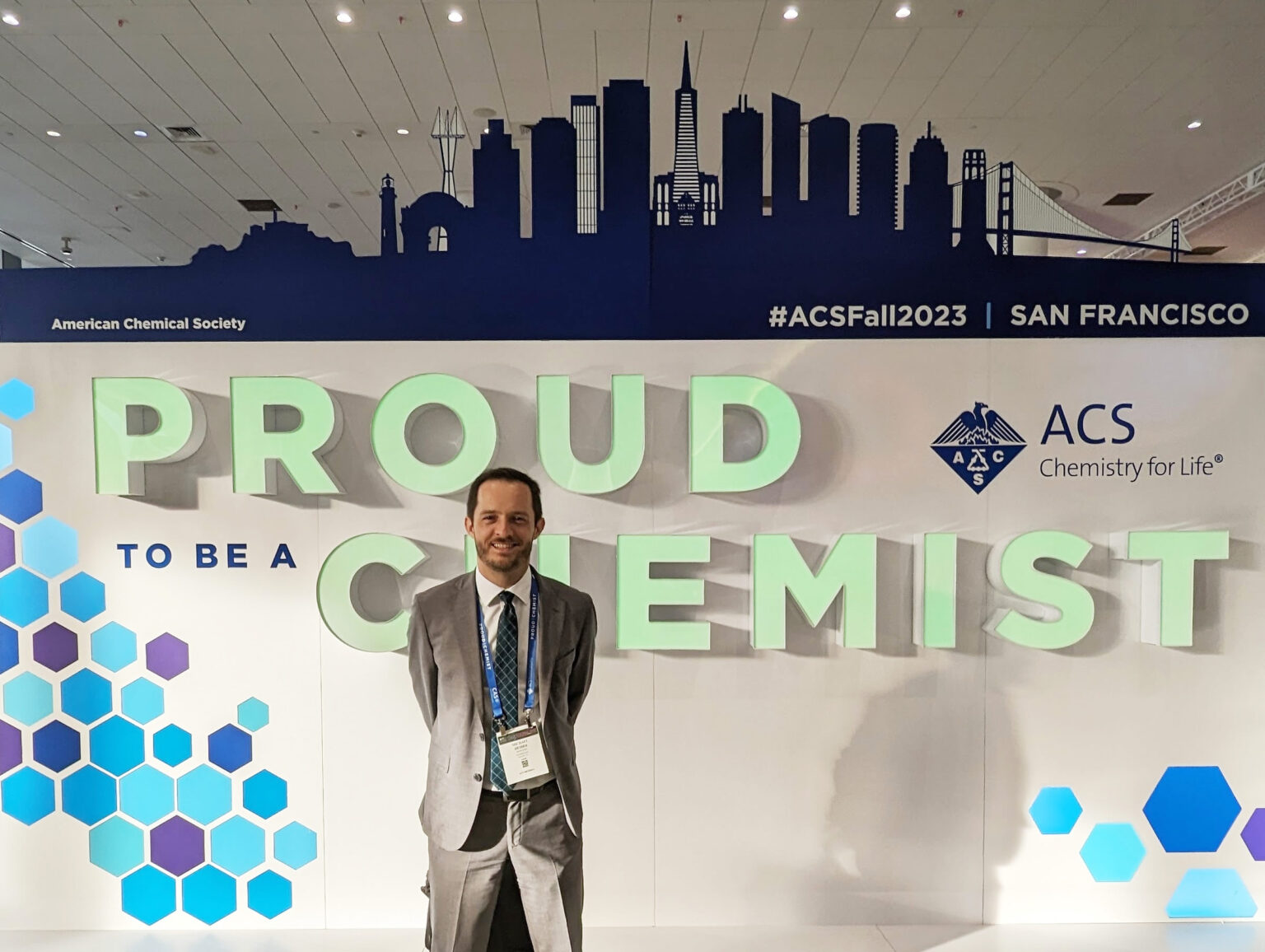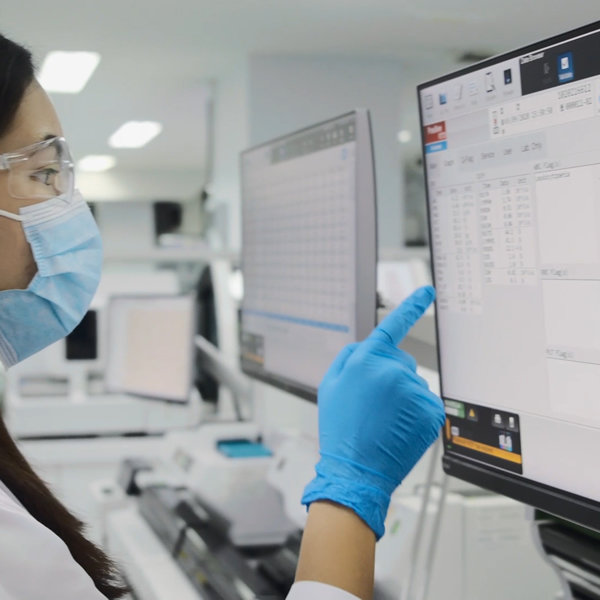2. ChatGPT and Generative AI in Science
ChatGPT and large language models (LLMs) have been all the rage for nearly a year now and are still producing exciting surprises. Enthought has been active in the discussion with the broader scientific community, where we have looked at this with a scientific and practical lens (see webinar What Every R&D Leader Needs to Know About ChatGPT and LLMs). That same tempered and practical view was echoed at the conference.
As we discussed ChatGPT with other scientists, it was generally acknowledged that the use cases for ChatGPT in science are still very niche but also quite powerful. For example, as we’ve seen in our own work, text summarization does help accelerate preliminary research but is not a game changer on its own. It's going to take a while to explore all the scientific use cases for ChatGPT.
While ChatGPT did not appear in many talks I attended, as both academia and industry are still figuring out its true potential, Generative AI certainly did. We recently wrote about this in our newsletter. There were several talks showcasing how Generative AI can be used for molecular design, from polymers to pharmaceuticals. I expect this number to grow next year as the research community explores more use cases and defines best practices for them. As we tell our clients, it's just a matter of time before Generative AI becomes a standard tool in the molecular design toolkit.
3. Digital Skills for Scientists and Managers
The number of scientists graduating with digital skills is increasing. This is not unexpected, and there is great demand for this talent. It will however take a while before the supply of talent meets the demand, but there are ways to mitigate that (like internal training). The bigger issue we see is that most organizations are not ready to effectively leverage that talent.
Based on our conversations at the conference, and through our consulting business in general, this lack of readiness is largely an organizational and strategic issue. It takes not only the right skills to leverage AI and ML for science, but strategies for picking the right projects to work on; collaborative models that incorporate business, IT, science, and analytical stakeholders; policies to incentivize participation in digital initiatives; and critically, a desire to go beyond one-size-fits-all solutions to more varied and complex challenges. There is a big difference between ‘doing digital’ and ‘being digital.’
Some of the work presented at the conference this year will prove to be transformative, but few organizations are properly equipped to identify and quickly incorporate these innovative methods into their product development process. As the prevalence of digital and industry-specific topics grows at the conference, the ways in which industry can effectively leverage digital tools will become more evident and eventually seen as imperative as part of a continuous improvement approach. Until then, we're here to help!
4. Open-Source for Scientific Innovation
When you see all of the work presented at the conference, it becomes clear that there is so much more room to innovate in this space. Similar technical topics appeared in multiple sub-industry tracks, but that's how you can tell that a technology is making an impact. That is typically facilitated by the availability of open-source software (OSS) or leads to its creation. Many of us at Enthought cut our teeth in graduate school by creating and sharing open-source software that supported our scientific research.
The same thing is happening at the ACS Fall Meeting. There was an entire track dedicated to OSS this year, and so much evidence in other tracks and poster sessions for the value it brings to the community. I recommend browsing titles and looking for software that is relevant to your work. There's a good chance someone else has at least started on a software tool to help with your current R&D challenge.
5. R&D Data Management Platforms
Data management is a big topic, so I attended the Big Data in Chemistry symposium to learn about the emerging use cases presented there. One of the industrial speakers in that track said something to the effect of, "We're doing science and engineering. We don’t have big data. We have small data." I found this timely, as I recently presented a webinar with C&EN on the subject.
There are as many data challenges as there are solutions. It goes to show how tricky "data management" is in materials science and chemistry specifically. We had many conversations about data-driven solutions while at the conference, and found that there is a growing acknowledgement that a focus on data management alone will not lead to accelerated innovation and better problem solving. Data management is necessary, but not sufficient, for R&D digital transformation to make a real impact. Many are disenchanted towards AI, machine learning, and digitalization when they figure this out after having invested heavily in technology that did not (and could not) meet their expectations.
We said to them what we say to our clients—innovation does not come in a box. To unlock the full potential of your scientific data and your experts, it's imperative to take a holistic approach and look end-to-end: the full product development workflow, the right-fit technologies, and the people using the technology. You don't have to transform the entire workflow at once, but you should start the journey with a vision of where you want to end up. From there you can be very practical about how you want to proceed given realistic budget restrictions, time constraints, and risk aversion. Without this, you will likely end up with an incomplete and disappointing solution that doesn’t actually bring real value to your organization.

The team left the ACS Fall Meeting energized about the direction of the field and excited about the focus on harnessing scientific data for discovery and product development.
Did you go? Would love to hear your thoughts - connect with me on LinkedIn.
Related Content
The Emergence of the AI Co-Scientist
The era of the AI Co-Scientist is here. How is your organization preparing?
Understanding Surrogate Models in Scientific R&D
Surrogate models are reshaping R&D by making research faster, more cost-effective, and more sustainable.
R&D Innovation in 2025
As we step into 2025, R&D organizations are bracing for another year of rapid-pace, transformative shifts.
Revolutionizing Materials R&D with “AI Supermodels”
Learn how AI Supermodels are allowing for faster, more accurate predictions with far fewer data points.
What to Look for in a Technology Partner for R&D
In today’s competitive R&D landscape, selecting the right technology partner is one of the most critical decisions your organization can make.
Digital Transformation vs. Digital Enhancement: A Starting Decision Framework for Technology Initiatives in R&D
Leveraging advanced technology like generative AI through digital transformation (not digital enhancement) is how to get the biggest returns in scientific R&D.
Digital Transformation in Practice
There is much more to digital transformation than technology, and a holistic strategy is crucial for the journey.
Leveraging AI for More Efficient Research in BioPharma
In the rapidly-evolving landscape of drug discovery and development, traditional approaches to R&D in biopharma are no longer sufficient. Artificial intelligence (AI) continues to be a...
Utilizing LLMs Today in Industrial Materials and Chemical R&D
Leveraging large language models (LLMs) in materials science and chemical R&D isn't just a speculative venture for some AI future. There are two primary use...
Top 10 AI Concepts Every Scientific R&D Leader Should Know
R&D leaders and scientists need a working understanding of key AI concepts so they can more effectively develop future-forward data strategies and lead the charge...



